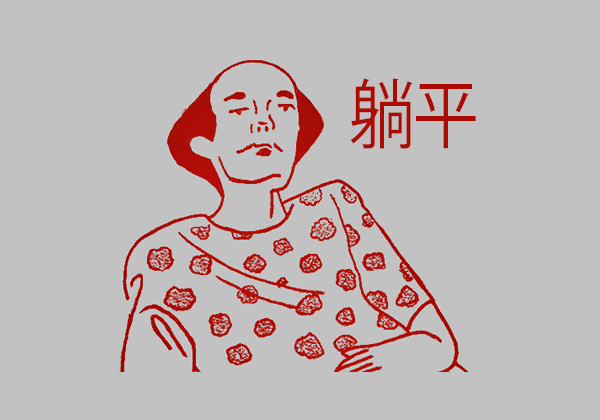On the 100th anniversary of its founding, and in the Year of the Ox, the Chinese Communist Party finds itself on the horns of a dilemma. In the grips of economic downturn and a dwindling population, the CCP looks to lean on its labourers; but they are no longer at the ready. Chinese youth, particularly the urban middle class, are increasingly adopting the trend of ‘Lying Flat,’ removing themselves from all economic, social and cultural activity as a form of protest. The reasons underpinning such protest echo years of disillusionment with the government and normative structures of onerous labour.
Since elementary school, the ‘nose to the grindstone’ culture has been ingrained in Chinese students. This pressure only accelerates leading up to the gaokao college entrance exam, which, owing to their notoriety, coincide with a public holiday. Students report cramming at least 12 hours a day, bemoaning the burdens of such a competitive system. Later in life, this culture translates into a gruelling work schedule, with young people expected to work a painstaking twelve hours a day, six days a week. Earlier this year, the deaths of two employees of Pinduoduo, a Chinese online marketplace, ignited a discussion around the crippling work pressures of modern life. The slogan ‘9-9-6’ is used to signify the typical work week – 9am to 9pm, 6 days a week – and has been co-opted by protestors throughout the movement to represent the relentlessness of Chinese work culture.
Fortified competition in the labour market compounds these concerns. The search for work has become incredibly difficult for young people, even for those who are highly educated. Li Tek*, a high-school teacher in Zijiang, explains that “nowadays there are lots of skilled and qualified people in China and the competition for various industries is fierce. This makes it difficult for young people to find jobs, let alone decent jobs.”
With social and economic mobility becoming less accessible, young people are also critical of the fact that the gains this culture of economic productivity reaps are disproportionately inherited by state-owned corporations, as well as a handful of tycoons. The youth of today have seen nothing near the explosive growth of wealth experienced by their parents’, or even their grandparents’ generations. With property and commodity prices soaring, many feel that this hypercompetitive work culture has failed to deliver gains to those working under it.
In the face of this sense of stagnation, and in an attempt to evade the constant pressure prescribed by the country’s long-held prosperity narrative, the youth in China are Lying Flat.
The term ‘Lying Flat’ was first seen in March, in a blog post on the Chinese search engine Baidu. The post read “Lying Flat is Justice” and heralded a new way of living which rejects the traditional career path prescribed to China’s educated youth. The post advised young people to avoid a culture of stress by refusing to work overtime, opting to work temporary jobs, eschewing material wants, and learning to live on smaller wages. “You just lie flat. Lying flat at home, lying flat outside, lying flat like the street cats and dogs,” the post read. Not only do the youth abstain from work, they also rescind themselves from the economy by refusing to enter the housing market and living a monastic, austere lifestyle. The author of the original Lying Flat thread outlines how he lives on $31 a month, eating only plain food twice a day to limit consumption.
Lying Flat also encourages abstention from the cultural norms expected by the CCP, such as marriage and childbearing. In response to high education costs and the pressure of raising achievement-striving children, compounded by other factors, many women are choosing to refrain from having children. As this proves precarious for the economy, the CCP counterbalances by proposing maternity benefit schemes which are largely ignored. Lying Flat ultimately reflects rebellious attitudes to CCP policy, hence why many youth also engage in active exposure with American media.
However, it must be noted that the movement’s popularity is mostly confined to the middle-class in major cities, such as Beijing and Shenzhen. It is largely inaccessible to the poorer youth population, many of whom are the sole earners in their families and do not have the economic safety net to grant them the luxury of ‘doing nothing.’
Lying Flat is in direct opposition to Xi Jinping’s hopes for a ‘rejuvenation of the Chinese nation’ via the empowerment of a young workforce and the CCP is actively working to discourage young people from participating in the trend. In May, the Global Times, a state-run newspaper, posted an opinion piece in response to the movement’s growing popularity. The piece was highly critical, expressing that “neither their personal situation, nor the situation of this country will allow them to ‘collectively lie flat.’” The official Xinhua News Agency also condemned the movement in late May, publishing a commentary that read, “Lying Flat is shameful. Only hard work brings true happiness.” The blog post that spurred the Lying Flat movement has also since been censored, and mentions of the movement are heavily restricted on the internet, with multiple forums having been deleted.
Whilst the movement of Lying Flat is still finding its footing, it is galloping towards mainstream popularity, and is accompanied by a herd of broader movements and protests demonstrating disenchantment. The Lying Flat movement uniquely exemplifies a renunciation of the central tenet of the Chinese prosperity narrative and serves as a broader commentary on the socioeconomic realities of the nation. As such, the CCP’s response to the movement will likely have a heavy hand in shaping the future of China’s work culture and the way in which it punctuates the lives of its people.
*Name changed to preserve anonymity





